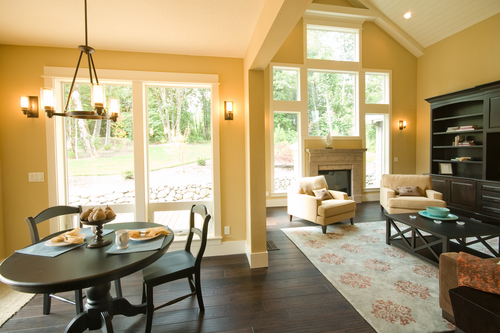If you plan to sell a home that requires renovation, you will need to make a decision on which aspect of renovating vs. lowering your asking price helps you accomplish your objectives.
Determining whether it works to your advantage to make improvements or adjust your price before putting the house on the market also requires an understanding of buyers and the prevailing real estate market.
Usually, most homebuyers expect certain basics when looking to purchase a personal residence.
A majority of buyers, especially the typical first-time homebuyer, wants nothing to do with renovating a property. They expect sellers to have homes in move-in condition. Some buyers will consider painting and adding their personal touches.
The components of a home that buyers expect a property to have in place, and in good condition, include the following items:
- Curb appeal
- Solid foundation and structures
- Leak proof roof and basement
- Solid ceiling walls and floors
- Plumbing, electrical, and heating and air-conditioning systems in good condition
Homes at the high-end of the real estate market require a certain number of bedrooms, bathrooms and garage spaces. Luxury homes also need to have amenities, such as multiple fireplaces or a swimming pool.
Keep in mind, some homebuyers—do-it-yourself enthusiasts and real estate investors, prefer “fixer uppers” that they can upgrade, make personal or put in some “sweat equity” to earn instant appreciation.
For a home that lack the basics accoutrements, making the necessary improvements will not necessarily add much value to the property. However, you can assure yourself of receiving the fair market value.
Perform the Due Diligence
Determine the selling prices of similar homes in the neighborhood that have sold within the past six months. A real estate agent can provide this information in the form of a comparable market analysis put together from multiple listing service data.
Ascertain where your home has deficiencies, in comparison to these homes, and obtain estimates on what it will cost to make the necessary corrections. Next, hire a home inspector to evaluate the property. The inspector can provide you with an inspection report, which list needed repairs and may include estimations for making the corrections.
A contractor can also provide estimates on making certain improvements to the home not covered in the inspector’s report.
Some Considerations
Write down your personal goals for selling you home. Some common objectives may include to sell the house by a certain date or to net a specific dollar amount from the sale of your home or both.
A fast transaction may require you to make the proper adjustment to the fair mark value of the home and sell it in the current condition. To net a specific dollar amount from the sale of your home, try to accomplish this aim without making any major enhancements before you move on to larger projects.
Avoid making costly renovations, especially if you hope to recover most of the costs. Make practical, cost-effective enhancements, such as landscaping or a dazzling new color scheme on the exterior.
Depending on your objectives, in a buyers’ market, it may work to your benefit to make improvements, which help make your property stand out from similar homes. In a seller’s market, depending on the location, you have better odds of commanding close to fair market price and making only minimal repairs.
Allow your due diligence and intentions guide how you approach the question of renovating your home vs. lowering the asking price. If you have the time and resources to make improvements, studies have shown that kitchen and bathroom projects offer the most impact in terms of recouping the cost and its affect on buyers.
If you plan to sell a home that requires renovation, you will need to make a decision on which aspect of renovating vs. lowering your asking price helps you accomplish your objectives.
Determining whether it works to your advantage to make improvements or adjust your price before putting the house on the market also requires an understanding of buyers and the prevailing real estate market.
Usually, most homebuyers expect certain basics when looking to purchase a personal residence.
A majority of buyers, especially the typical first-time homebuyer, wants nothing to do with renovating a property. They expect sellers to have homes in move-in condition. Some buyers will consider painting and adding their personal touches.
The components of a home that buyers expect a property to have in place, and in good condition, include the following items:
- Curb appeal
- Solid foundation and structures
- Leak proof roof and basement
- Solid ceiling walls and floors
- Plumbing, electrical, and heating and air-conditioning systems in good condition
Homes at the high-end of the real estate market require a certain number of bedrooms, bathrooms and garage spaces. Luxury homes also need to have amenities, such as multiple fireplaces or a swimming pool.
Keep in mind, some homebuyers—do-it-yourself enthusiasts and real estate investors, prefer “fixer uppers” that they can upgrade, make personal or put in some “sweat equity” to earn instant appreciation.
For a home that lack the basics accoutrements, making the necessary improvements will not necessarily add much value to the property. However, you can assure yourself of receiving the fair market value.
Perform the Due Diligence
Determine the selling prices of similar homes in the neighborhood that have sold within the past six months. A real estate agent can provide this information in the form of a comparable market analysis put together from multiple listing service data.
Ascertain where your home has deficiencies, in comparison to these homes, and obtain estimates on what it will cost to make the necessary corrections. Next, hire a home inspector to evaluate the property. The inspector can provide you with an inspection report, which list needed repairs and may include estimations for making the corrections.
A contractor can also provide estimates on making certain improvements to the home not covered in the inspector’s report.
Some Considerations
Write down your personal goals for selling you home. Some common objectives may include to sell the house by a certain date or to net a specific dollar amount from the sale of your home or both.
A fast transaction may require you to make the proper adjustment to the fair mark value of the home and sell it in the current condition. To net a specific dollar amount from the sale of your home, try to accomplish this aim without making any major enhancements before you move on to larger projects.
Avoid making costly renovations, especially if you hope to recover most of the costs. Make practical, cost-effective enhancements, such as landscaping or a dazzling new color scheme on the exterior.
Depending on your objectives, in a buyers’ market, it may work to your benefit to make improvements, which help make your property stand out from similar homes. In a seller’s market, depending on the location, you have better odds of commanding close to fair market price and making only minimal repairs.
Allow your due diligence and intentions guide how you approach the question of renovating your home vs. lowering the asking price. If you have the time and resources to make improvements, studies have shown that kitchen and bathroom projects offer the most impact in terms of recouping the cost and its affect on buyers.







